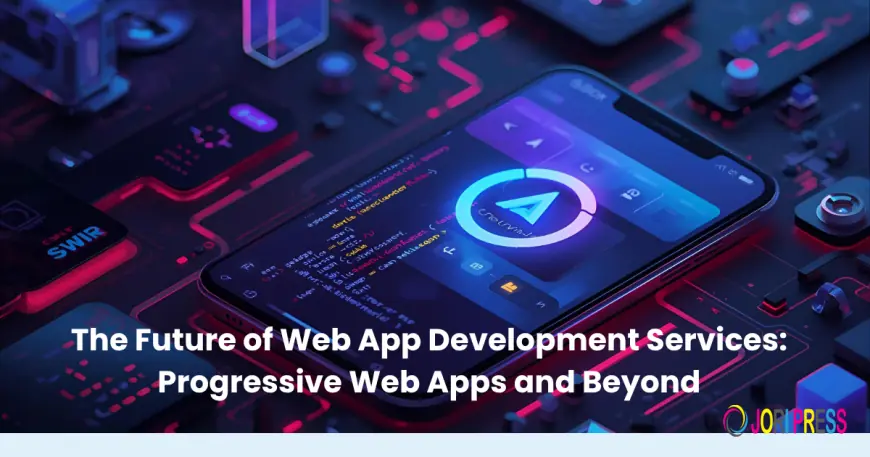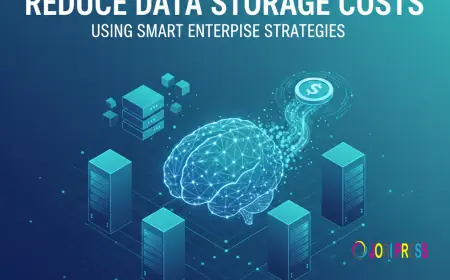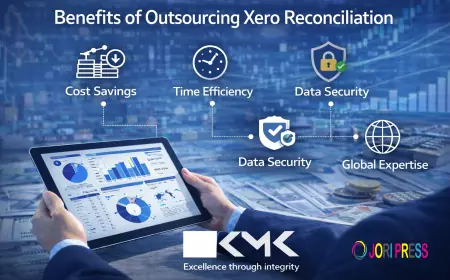The Future of Web App Development Services: Progressive Web Apps and Beyond
Discover how Web App Development Services are evolving with Progressive Web Apps and next-gen technologies shaping the digital experience of tomorrow.

Web applications are no longer limited to simple websites. Modern users demand fast, intuitive, and seamless experiences that bridge the gap between mobile apps and traditional websites. Businesses today are seeking web app development services that not only provide functionality but also enhance engagement, conversion, and scalability.
With the rise of Progressive Web Apps (PWAs), web development has taken a major leap forward, allowing applications to work offline, deliver push notifications, and load instantly. However, the future extends even beyond PWAs, integrating technologies such as WebAssembly, AI, AR/VR, edge computing, and decentralized systems to create next-generation web experiences.
This blog explores these trends in detail and explains how businesses can leverage them to stay competitive.
Understanding Web App Development Services
Web app development services are professional services that design, build, and maintain web applications for businesses. Unlike simple websites, web apps are interactive, dynamic, and capable of complex functionalities. These services typically include:
-
Frontend Development: Focuses on user interfaces, user experience (UX/UI), and responsiveness using frameworks like React, Angular, or Vue.js.
-
Backend Development: Involves server-side logic, database management, APIs, and business logic using technologies like Node.js, Django, or Laravel.
-
Full-Stack Development: Combines frontend and backend development to create cohesive, scalable web applications.
-
Maintenance and Support: Includes monitoring performance, fixing bugs, updating security, and adding new features post-launch.
Modern web app services also emphasize cross-platform compatibility, cloud integration, microservices architecture, and performance optimization to deliver scalable and robust solutions for businesses of all sizes.
What Are Progressive Web Apps (PWAs)?
Progressive Web Apps (PWAs) are web applications designed to deliver native app-like experiences directly in a browser. They combine the reach of the web with the usability of mobile apps. PWAs are built using standard web technologies such as HTML, CSS, and JavaScript, but leverage modern web APIs to provide enhanced features:
-
Service Workers: Allow apps to function offline and cache content for faster load times.
-
Push Notifications: Engage users with timely updates without relying on email or traditional marketing channels.
-
App-Like Interface: Provides smooth navigation, responsive design, and immersive UI similar to native apps.
-
Installable: Users can add PWAs to their home screen without going through an app store.
PWAs are a key part of modern web app development services, especially for businesses that want to reduce development costs while maximizing user engagement.
Key Benefits of PWAs
The adoption of PWAs in web app development services is driven by multiple advantages:
-
Offline Accessibility:
-
PWAs use service workers to cache key resources, allowing the application to load even without internet connectivity.
-
This is crucial for businesses targeting regions with unreliable internet access or for apps requiring continuous availability.
-
Improved Performance:
-
PWAs load faster than traditional web apps because of caching strategies and pre-loading critical assets.
-
Faster performance reduces bounce rates and improves user satisfaction.
-
Cost Efficiency:
-
Unlike native apps, PWAs require a single codebase for all platforms.
-
Businesses save on development, maintenance, and updates for multiple operating systems.
-
Enhanced User Engagement:
-
Push notifications, home screen installation, and smooth offline usage increase user interaction and retention.
-
Studies show that PWAs can boost engagement by 30–50% compared to traditional mobile sites.
-
SEO-Friendly:
-
Unlike native apps, PWAs are indexable by search engines.
-
This improves discoverability, driving organic traffic and reducing reliance on paid marketing channels.
Emerging Trends in Web App Development
Web app development services are evolving to meet modern requirements. Some key trends include:
-
AI-Powered Web Apps:
-
Integration of artificial intelligence enables personalized content, recommendations, and chatbots.
-
AI can also analyze user behavior to optimize engagement and conversions.
-
Serverless Architecture:
-
Reduces the need for dedicated backend servers by utilizing cloud-based functions.
-
Benefits include scalability, reduced costs, and easier maintenance.
-
Motion UI and Micro-Interactions:
-
Animations, hover effects, and subtle interactions enhance the user experience.
-
These small details make web apps feel modern and intuitive.
-
API-First Development:
-
Applications are built around APIs, allowing seamless integration with other services, third-party platforms, or microservices.
-
Promotes modularity and scalability in web applications.
-
Cybersecurity-First Design:
-
Security is integrated into the development lifecycle using encryption, authentication, and secure coding practices.
-
Essential for enterprise applications handling sensitive data.
Beyond PWAs: The Next Generation of Web Applications
The future of web apps is not limited to PWAs. Advanced technologies are pushing the boundaries:
-
WebAssembly (Wasm):
-
Allows high-performance applications to run in the browser at near-native speed.
-
Ideal for gaming, CAD software, data visualization, and other computationally intensive apps.
-
Single Page Applications (SPAs) 2.0:
-
Frameworks like React, Angular, and Vue.js enable faster, smoother navigation without full page reloads.
-
Improved SEO strategies make SPAs more discoverable by search engines.
-
Decentralized Web Apps (DApps):
-
Built on blockchain technology, enabling secure, transparent, and trustless transactions.
-
Useful in finance, supply chain, and decentralized marketplaces.
-
AR/VR Web Experiences:
-
WebXR and WebGL APIs allow AR/VR experiences directly in browsers.
-
Opens opportunities in retail, education, real estate, and immersive marketing.
-
Edge Computing Integration:
-
Processes data closer to the user, reducing latency and improving real-time performance.
-
Crucial for applications like gaming, IoT dashboards, and live collaboration tools.
Challenges in Adopting Advanced Web App Services
Despite the opportunities, businesses may face obstacles:
-
Browser Compatibility: Ensuring consistent performance across multiple browsers and devices can be complex.
-
Security Concerns: Advanced apps need robust protection against cyber threats.
-
Skill Gaps: Next-gen technologies like AI, AR/VR, and WebAssembly require specialized expertise.
-
User Adoption: Convincing users to switch to PWAs or other advanced apps may require additional education and marketing.
Overcoming these challenges requires strategic planning, expert developers, and ongoing updates.
How Businesses Can Prepare for the Future
To capitalize on the evolution of web app development services, businesses should:
-
Invest in PWAs and SPA frameworks to deliver responsive, high-performance experiences.
-
Leverage AI and edge computing to offer real-time personalization and high-speed performance.
-
Implement security-first practices for data protection and compliance.
-
Continuously analyze user behavior to optimize the app features and engagement.
-
Partner with experienced web app development service providers for guidance and expertise.
By adopting these strategies, businesses can ensure their web applications remain competitive and future-proof.
Conclusion
The landscape of web app development services is evolving rapidly. Progressive Web Apps have already redefined user experience by combining speed, accessibility, and engagement. However, the future extends beyond PWAs into WebAssembly, AR/VR, DApps, and AI-powered applications.
Businesses that embrace these technologies will not only enhance user experience but also gain a competitive edge in a digital-first world.
FAQs
Q1. Are PWAs better than native apps?
PWAs are ideal for businesses that need cross-platform accessibility, offline support, and cost efficiency. Native apps may still be preferred for resource-intensive applications.
Q2. Can PWAs work offline?
Yes, PWAs use service workers to cache resources and enable offline functionality.
Q3. What is WebAssembly, and why is it important?
WebAssembly enables near-native performance in browsers, allowing complex applications like 3D modeling or gaming to run smoothly online.
Q4. How do web app development services stay ahead of trends?
By integrating emerging technologies, following best practices, and continuously updating apps based on user behavior.
Q5. Are web apps secure for enterprise use?
Yes, with proper security protocols like encryption, authentication, and compliance measures, web apps can meet enterprise-grade standards.
What's Your Reaction?
 Like
0
Like
0
 Dislike
0
Dislike
0
 Love
0
Love
0
 Funny
0
Funny
0
 Angry
0
Angry
0
 Sad
0
Sad
0
 Wow
0
Wow
0

















































